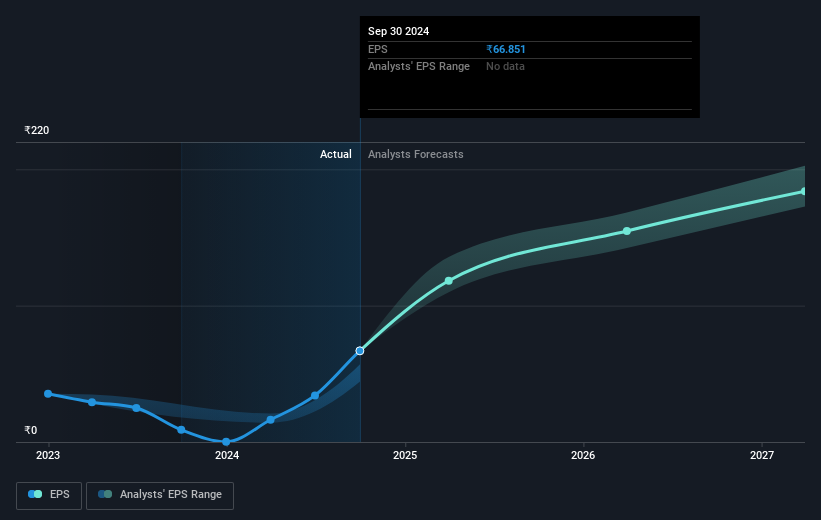- India
- /
- Capital Markets
- /
- NSEI:MCX
Multi Commodity Exchange of India (NSE:MCX) jumps 3.4% this week, though earnings growth is still tracking behind five-year shareholder returns
We think all investors should try to buy and hold high quality multi-year winners. And we've seen some truly amazing gains over the years. To wit, the Multi Commodity Exchange of India Limited (NSE:MCX) share price has soared 473% over five years. This just goes to show the value creation that some businesses can achieve. On top of that, the share price is up 21% in about a quarter.
Since the stock has added ₹11b to its market cap in the past week alone, let's see if underlying performance has been driving long-term returns.
View our latest analysis for Multi Commodity Exchange of India
To quote Buffett, 'Ships will sail around the world but the Flat Earth Society will flourish. There will continue to be wide discrepancies between price and value in the marketplace...' By comparing earnings per share (EPS) and share price changes over time, we can get a feel for how investor attitudes to a company have morphed over time.
Over half a decade, Multi Commodity Exchange of India managed to grow its earnings per share at 9.6% a year. This EPS growth is lower than the 42% average annual increase in the share price. This suggests that market participants hold the company in higher regard, these days. That's not necessarily surprising considering the five-year track record of earnings growth. This favorable sentiment is reflected in its (fairly optimistic) P/E ratio of 92.91.
The image below shows how EPS has tracked over time (if you click on the image you can see greater detail).

We know that Multi Commodity Exchange of India has improved its bottom line lately, but is it going to grow revenue? You could check out this free report showing analyst revenue forecasts.
What About Dividends?
It is important to consider the total shareholder return, as well as the share price return, for any given stock. The TSR is a return calculation that accounts for the value of cash dividends (assuming that any dividend received was reinvested) and the calculated value of any discounted capital raisings and spin-offs. So for companies that pay a generous dividend, the TSR is often a lot higher than the share price return. As it happens, Multi Commodity Exchange of India's TSR for the last 5 years was 510%, which exceeds the share price return mentioned earlier. And there's no prize for guessing that the dividend payments largely explain the divergence!
A Different Perspective
It's good to see that Multi Commodity Exchange of India has rewarded shareholders with a total shareholder return of 105% in the last twelve months. That's including the dividend. That gain is better than the annual TSR over five years, which is 44%. Therefore it seems like sentiment around the company has been positive lately. Given the share price momentum remains strong, it might be worth taking a closer look at the stock, lest you miss an opportunity. Before forming an opinion on Multi Commodity Exchange of India you might want to consider these 3 valuation metrics.
We will like Multi Commodity Exchange of India better if we see some big insider buys. While we wait, check out this free list of undervalued stocks (mostly small caps) with considerable, recent, insider buying.
Please note, the market returns quoted in this article reflect the market weighted average returns of stocks that currently trade on Indian exchanges.
New: Manage All Your Stock Portfolios in One Place
We've created the ultimate portfolio companion for stock investors, and it's free.
• Connect an unlimited number of Portfolios and see your total in one currency
• Be alerted to new Warning Signs or Risks via email or mobile
• Track the Fair Value of your stocks
Have feedback on this article? Concerned about the content? Get in touch with us directly. Alternatively, email editorial-team (at) simplywallst.com.
This article by Simply Wall St is general in nature. We provide commentary based on historical data and analyst forecasts only using an unbiased methodology and our articles are not intended to be financial advice. It does not constitute a recommendation to buy or sell any stock, and does not take account of your objectives, or your financial situation. We aim to bring you long-term focused analysis driven by fundamental data. Note that our analysis may not factor in the latest price-sensitive company announcements or qualitative material. Simply Wall St has no position in any stocks mentioned.
About NSEI:MCX
Multi Commodity Exchange of India
A commodity derivatives exchange, provides a platform to facilitate online trading of commodity derivatives in India.
Outstanding track record with excellent balance sheet and pays a dividend.
Market Insights
Community Narratives



